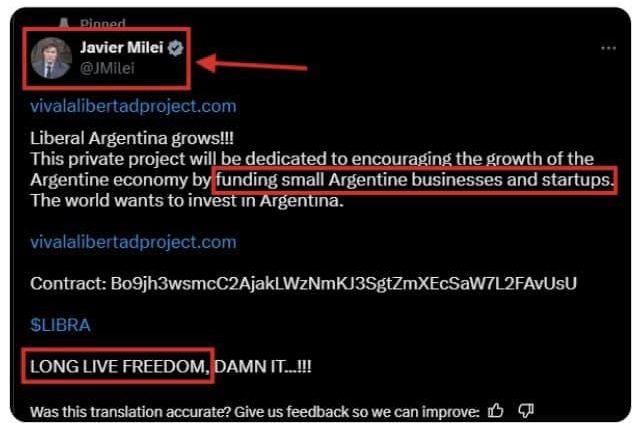In February 2025, Argentina experienced an unprecedented episode: its president, Javier Milei, promoted on X a crypto named $LIBRA. A few hours later, the price collapsed, leaving thousands of investors stranded with estimated losses of 400 million dollars. A parliamentary committee has just concluded an “alleged scam“.
In Brief
- •An Argentinian parliamentary report concludes that there was “alleged fraud” in the promotion of the $LIBRA crypto by Javier Milei.
- •Milei’s allies reject the report, calling it a political maneuver and “idiocy,” while the opposition demands accountability.
- •The $LIBRA affair raises questions about the risks of opaque crypto launches and the influence of public officials in their promotion.
Parliamentary Report Accuses Javier Milei of Scam in $LIBRA Affair
The investigative committee, chaired by the opposition, delivered its verdict on November 19, 2025: the facts analyzed in the $LIBRA case are compatible with a scam. According to the report, Javier Milei and his sister, Karina Milei, bear “political responsibility” in this crypto scandal. Deputies emphasize that the presidential promotion served as a catalyst for a “rug pull“, a scam where developers abandon a project after attracting funds.
On February 14, 2025, Javier Milei shared an enthusiastic message on X, praising the crypto $LIBRA as a tool to finance Argentine SMEs. Within hours, tens of thousands of investors, many of them individuals, had bought the token. Then, the price collapsed, causing colossal losses. Milei later stated he did not know the project details. However, dozens of complaints have been filed, centralized under the authority of a judge and a prosecutor.

The report highlights the abusive use of presidential influence to promote a speculative asset, as well as the lack of transparency surrounding the crypto project. The findings have been forwarded to the judiciary, which must determine if prosecution is possible.
Milei's Supporters Denounce a "Null" and Politicized Report
From the moment the report on the crypto $LIBRA was published, Javier Milei’s supporters cried conspiracy. For them, this investigation is merely a political maneuver aimed at weakening the president before the next elections. Majority deputies boycotted the committee’s work, denouncing a “null” and “buffoonish” report, according to the terms used during parliamentary debates.
Milei’s close associates recall that the president did not benefit directly from $LIBRA and that his promotion on X was a simple “communication error“. They accuse the Peronist opposition of instrumentalizing justice to discredit a government shaking up the establishment.
$LIBRA, Bitcoin, and the Risks of Crypto Launches
The $LIBRA affair reminds us of the dangers of opaque crypto launches. Unlike Bitcoin (BTC), whose transparency and decentralization have built long-term credibility, $LIBRA was launched without an independent audit, with a presidential promotion that served as bait to attract uninformed investors. The result was an immediate collapse after an organized “pump and dump”.
The risks are multiple:
- •Fishing, which consists of using authority figures to legitimize dubious crypto projects;
- •Rug pull, which refers to a scam where developers abandon a project after cashing in funds.
In both cases, investors are the first victims. Users must therefore be extra cautious with crypto projects promoted by influencers or politicians, especially when transparency is lacking.
The $LIBRA affair therefore raises a crucial question: how far can the responsibility of public figures go in promoting risky financial assets? As Argentine justice continues its investigations, this crypto scandal involving Javier Milei could inspire stricter regulations elsewhere in the world. In your opinion, should political leaders be banned from promoting cryptocurrencies?

